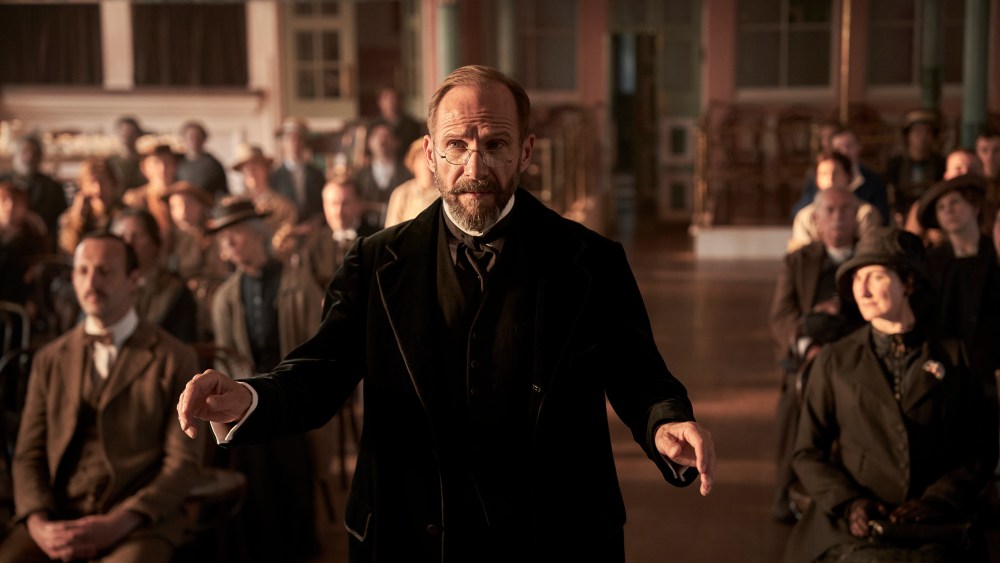Ralph Fiennes on ‘The Choral’,”Hunger Games: Sunrise on the Reaping’
When Ralph Fiennes wasn’t on stage seeing a dagger before him, while starring in a Washington, D.C. production of “MacBeth,” he was furiously trying to unlock his inner Leonard Bernstein. The Oscar-nominated actor was a last-minute addition to the cast of “The Choral,” a drama set in a small town in the United Kingdom during World War I, and his role as an exacting choir master required him to be fluent with the baton. So with less than six weeks to go before cameras rolled, Fiennes enlisted Natalie Murray Beale, a leading conductor who taught Cate Blanchett how to run herd over an orchestra for “Tár,” to get him into shape.
“I don’t read music, so it was very hard to understand, not just the beats, but how the hand moves,” Fiennes says. “But Nat was terrifically patient. They tell me that thanks to some skillful camera angles, I got away with it.”
“The Choral,” which premieres at the Toronto Film Festival, is directed by Nicholas Hytner, a frequent collaborator of Fiennes from his many stage shows. The two had been looking for a film to work on together for some time, and Fiennes liked the way that the script for “The Choral,” which was written by Tony-winning playwright Alan Bennett, was alternately funny and poignant as it charted the war’s impact on a community.
“The spirit of the script was so moving,” Fiennes says. “I loved its essential message that music brings people together, even in the the context of the terrible loss of life during the First World War. It was very painful, but also beautiful.”
However, Fiennes was only able to join “The Choral” after another project fell apart at the last minute. He threw himself into the role of Dr. Guthrie, a closeted gay man whose time spent working as a music director in Germany before the war has tarnished his reputation and made his loyalties suspect.
“He can’t talk about his life as a gay man, so he’s put everything into music,” Fiennes says. “That’s where he gets fulfillment and meaning in his life. And that moves me. There are artists, whether they’re writers or composers or painters, whose raison d’etre is to create. They have this profound belief that art is this transformative thing that humans need to survive.”
In “The Choral,” a group of amateur singers in Yorkshire comes together under Dr. Guthrie’s guidance to perform Edward Elgar’s “The Dream of Gerontius” for their community. The pressures of the war wear on the performers in different ways — the younger men grapple with the fear of being called up to serve, many of the women have boyfriends on the front lines and some of the older members have lost children in battle. Given what’s happening in Ukraine and the Middle East, Fiennes was able to find modern-day parallels.
“We’re in a mess,” Fiennes says. “In so much of the world you’ve got horror and the destruction of war happening and people not knowing if they’ll go off to fight and not come back. Man hasn’t stopped killing and destroying. What do we have? We have music, we have art. We have something that can, for a moment, take us away from the obscenities that keep happening.”
Next up, Fiennes will trade the English countryside at the beginning of the war-torn 20th Century for Panem somewhere in a dystopian future. He’s set to play President Coriolanus Snow in “The Hunger Games: Sunrise on the Reaping,” which will start shooting in October.
“I’m a great fan of Donald Sutherland, who played the role in ‘The Hunger Games,’ and I think it’s a smart franchise,” Fiennes says. “The script is quite good and I have a scene with Jesse Plemons, who I’m a huge fan of, that I can’t wait to shoot.”
Fiennes will play a supporting role in the film, just as he does in “The Choral.” Despite his three Oscar nominations and lead roles in films like “The Grand Budapest Hotel” and “The English Patient,” he doesn’t mind sharing the spotlight.
“When you’re in an ensemble film, it creates a great community atmosphere,” he says. “If everyone has their slice of the cake, they feel much more invested. It’s more like a family.”

